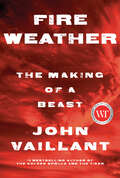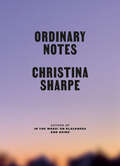Résultats de recherche de titre
Articles 1 à 2 sur 2

Fire Weather: The Making of a Beast
Par John Vaillant. 2023
Braille (abrégé), Braille électronique (abrégé), DAISY Audio (Téléchargement Direct), DAISY Audio (Zip), DAISY texte (Téléchargement direct), DAISY texte (Zip), Word (Zip), ePub (Zip)
Nature, Politique et gouvernement, Sciences et technologies
Audio avec voix de synthèse, Braille automatisé
#1 NATIONAL BESTSELLERWINNER OF THE BAILLIE GIFFORD PRIZE FOR NONFICTION • FINALIST FOR THE HILARY WESTON WRITERS' TRUST PRIZE FOR…
NONFICTION • FINALIST FOR THE NATIONAL BOOK AWARD IN NONFICTION • ONE OF THE NEW YORK TIMES&’ TOP TEN BOOKS OF THE YEAR • A stunning account of the colossal wildfire at Fort McMurray, and a panoramic exploration of the rapidly changing relationship between fire and humankind from the award-winning, best-selling author of The Tiger and The Golden Spruce.Named a Best Book of the Year by The Guardian • TIME • The Globe and Mail • The New Yorker • Financial Times • CBC • Smithsonian • Air Mail Weekly • Slate • NPR • Toronto Star • The Washington Post • The Times • Orion MagazineIn May 2016, Fort McMurray, the hub of Canada's petroleum industry and America's biggest foreign supplier, was overrun by wildfire. The multi-billion-dollar disaster melted vehicles, turned entire neighborhoods into firebombs, and drove 88,000 people from their homes in a single afternoon. Through the lens of this apocalyptic conflagration—the wildfire equivalent of Hurricane Katrina—John Vaillant warns that this was not a unique event but a shocking preview of what we must prepare for in a hotter, more flammable world. For hundreds of millennia, fire has been a partner in our evolution, shaping culture, civilization, and, very likely, our brains. Fire has enabled us to cook our food, defend and heat our homes, and power the machines that drive our titanic economy. Yet this volatile energy source has always threatened to elude our control, and in our new age of intensifying climate change, we are seeing its destructive power unleashed in previously unimaginable ways. With masterly prose and a cinematic eye, Vaillant takes us on a riveting journey through the intertwined histories of North America's oil industry and the birth of climate science, to the unprecedented devastation wrought by modern forest fires, and into lives forever changed by these disasters. John Vaillant's urgent work is a book for—and from—our new century of fire, which has only just begun.
Ordinary Notes
Par Christina Sharpe. 2023
Braille (abrégé), Braille électronique (abrégé), DAISY Audio (Téléchargement Direct), DAISY Audio (Zip), DAISY texte (Téléchargement direct), DAISY texte (Zip), Word (Zip), ePub (Zip)
Biographies, Politique et gouvernement, Essais et documents généraux
Audio avec voix de synthèse, Braille automatisé
One of The Millions&’ &“Most Anticipated Books of 2023One of The New York Times&’ &“19 Works of Nonfiction to Read…
This Spring&”A dazzlingly inventive, deeply moving, intellectually bracing exploration of pain and beauty, private memory and public monument, art and complexity in contemporary Black life.&“I wanted to write about silences and terror and acts that hover over generations, over centuries. I began by writing about my mother and grandmother.&” —from &“Note 18&” in Ordinary NotesA singular achievement, Ordinary Notes explores with immense care profound questions about loss, and the shapes of Black life that emerge in the wake. In a series of 248 brief and urgent notes that gather meaning as we read them, Christina Sharpe skillfully weaves artifacts from the past—public ones alongside others that are poignantly personal—with present-day realities and possible futures, intricately constructing an immersive portrait of everyday Black existence. Through the striking images and words in these pages, themes and tones echo: sometimes about life, art, language, beauty, memory; sometimes about history, photography, and literature—but always attending, with exquisite care, to the ordinary-extraordinary dimensions of Black life. At the heart of Ordinary Notes is the indelible presence of the author&’s mother, Ida Wright Sharpe. &“I learned to see in my mother&’s house,&” writes Sharpe. &“I learned how not to see in my mother&’s house . . . My mother gifted me a love of beauty, a love of words.&” Using these and other gifts and ways of seeing, Sharpe steadily summons a chorus of voices and experiences to become present on the page. She articulates and follows an aesthetic of "beauty as a method,&” collects entries from a community of thinkers towards a &“Dictionary of Untranslatable Blackness,&” and rigorously examines sites of memory and memorial. And in the process, she forges a new literary form, as multivalent as the ways of Black being it traces.